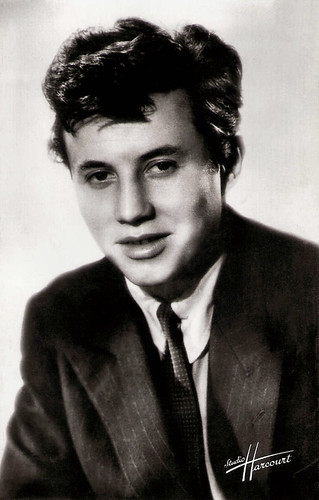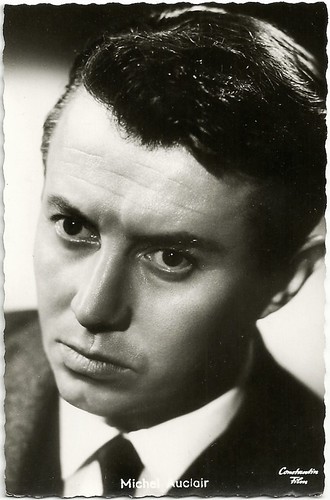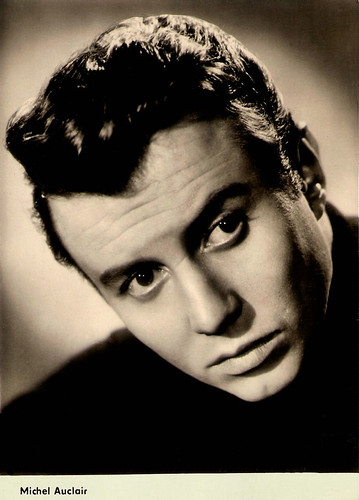
French postcard by O.P., Paris. no. 77. Photo: Studio Harcourt.

French postcard by Editions du Globe, Paris, no. 225. Photo Studio Harcourt.
A menacing but also fragile seducer
Michel Auclair was born Vladimir Vujović in Koblenz, Germany, in 1922. His father was Vojislav Vujović, a prominent Yugoslav Communist and a secretary of the Communist Youth International, and his mother was Charlotte Caspar, French biologist and sister of John Marchat. Auclair moved to Paris when he was three years old. He later entered medical school but then studied acting at the Conservatoire (CNSAD) in Paris.
His stage debut was at the Théâtre de l'Œuvre in 1940 and he appeared in plays by Alfred de Musset, Jean Cocteau and Henrik Ibsen. His stage name was based on the title of a play by Charles Vildrac, which revolves around the loyalty of a man to a woman who has rejected him. It was written in the year of the actor's birth, 1921.
Auclair made his screen debut after the war in the classic La Belle et la Bête/Beauty and the Beast (Jean Cocteau, 1946). It was followed by a part in the war drama Les Maudits/The Damned (René Clément, 1946). Two years later he starred in Manon (Henri-Georges Clouzot, 1949) as a French Resistance fighter who rescues a woman (Cécile Aubry) from villagers convinced she is a Nazi collaborator. The film won the Golden Lion at the Venice Film Festival.
In the following decade, he gradually developed into a leading man in post-war French cinema. His type was the deprived dandy, a menacing but also fragile seducer.
His films included the German-French whodunit Unter den tausend Laternen/Under Thousand Lanterns (Erich Engel, 1952), the comedy La fête à Henriette/Holiday for Henrietta (Julien Duvivier, 1952) with Dany Robin, the historical epic Si Versailles m'était conté/Royal Affairs in Versailles (Sacha Guitry, 1954), the Georges Siménon adaptation Maigret et l'affaire Saint-Fiacre/Maigret and the St. Fiacre Case (Jean Delannoy, 1959) starring Jean Gabin, and L'Education Sentimentale/Sentimental Education (Alexandre Astruc, 1962) with Jean-Claude Brialy and Marie-José Nat.

French card by Editions La Malibran, Saint-Dié, no CF 19. Photo: Aldo. Jean Marais, Marcel André, Michel Auclair and Josette Day in La belle et la bête/Beauty and the Beast (Jean Cocteau, René Clément, 1946).

French postcard by Editions P.I., Paris, no. 959 A. Publicity card for Les Carbones Korès. Photo: Sam Lévin.

German postcard by Ufa (Universum-Film Aktien Gesellschaft), Berlin-Tempelhof, no. FK 1020. Retail price: 25 Pfg. Photo: Lucienne Chevert, Paris.

German postcard by WS-Druck, Wanne-Eickel, no. 124. Photo: Lantin.

French collectors card by Editions P.I. Paris for Biscottes Corvisart, Epinal.
Shady film producer
While a major French star, Michel Auclair only had a few English-language roles: as Professor Flostre in the musical Funny Face (Stanley Donen, 1957) with Audrey Hepburn and Fred Astaire, as a French police investigator in Day of the Jackal (Fred Zinnemann, 1973) with Edward Fox, as a cuckolded husband in Story of a Love Story (John Frankenheimer, 1973) with Alan Bates, and a doctor in the spy film Enigma (Jeannot Swarc, 1983) with Martin Sheen.
Auclair played in excellent European productions like the political thriller Le Juge Fayard Dit le Sheriff/Judge Fayard, Called the Sheriff (Yves Boisset, 1977) starring Patrick Dewaere, Trois Hommes à Abattre/Three Men to Kill (Jacques Deray, 1980) with Alain Delon, Mille Milliards de Dollars/A Thousand Billion Dollars (Henri Verneuil, 1982) another political thriller starring Patrick Dewaere, and the mysterious fantasy La Belle Captive/The Beautiful Prisoner (Alain Robbe-Grillet, 1983).
Michel Auclair was also a distinguished stage actor. On television, he is remembered as Luis de Sant'angel in the mini-series Christopher Columbus (Alberto Lattuada, 1985) starring Gabriel Byrne.
Michel Auclair died of a cerebral haemorrhage in 1988, in Saint-Paul-en-Forêt, Var, France. He was 65 and ad appeared in over 100 films.
In Preuve D'Amour/Love Token (Miguel Courtois, 1988), Auclair played one of his last screen roles: a shady film producer. The feature is dedicated to him.

German postcard by Netter's Star Verlag, Berlin.

German postcard by Kolibri-Verlag. Co., München. Photo: Kurt Ulrich-Film / Constantin Film / Wesel. Michel Auclair in the WWII thriller Der Fuchs von Paris/The Fox of Paris (Paul May, 1957).

French postcard, no. 153.

East-German postcard by VEB Progress Film-Vertrieb, Berlin, no. 1428, 1961. Photo: Progress. Publicity still for Unter den Tausend Laternen/Under Thousand Lanterns (1952).
Sources: Hal Erickson (AllMovie), José L Bernabé Tronchoni (Find A Grave), Wikipedia, and IMDb.
This post was last updated on 28 April 2023.
No comments:
Post a Comment